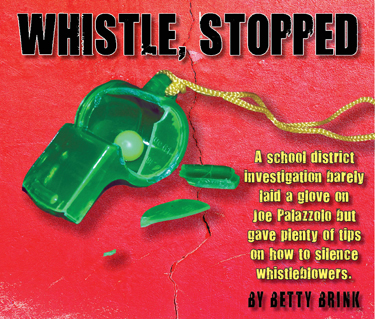Joe Palazzolo’s friends might be forgiven for thinking that’s not his real first name. Surely it should be “Job.”
Palazzolo, of course, is the former assistant principal who blew the whistle on malfeasance by top administrators at Arlington Heights High School and, in the process, opened up to public view a wider culture of intimidation in the Fort Worth school district that is still being dealt with.
For his trouble, the six-foot-three retired Army captain was fired by then-superintendent Melody Johnson. His story has taken so many strange turns since then that he probably should have a roller-coaster named after him.
The strangest turn yet might be what happened on Feb. 14. The eight-member school board voted to pay him a year’s salary — and might or might not have fired him.
Attorneys for Palazzolo and the district are still picking through the remains of that meeting, trying to decide where they all stand.
Plus, there’s a whistleblower lawsuit that Palazzolo filed against the district last year, now set for trial May 15 in district court in Wise County.
In the meantime, the former assistant principal is sitting home. In the last two years he’s been demoted, transferred, suspended, fired, and reinstated — and still isn’t sure of his status.
To date, his case has been heard by the state education commissioner, the Texas Workforce Commission, and a state district court judge, all of whom ruled in his favor. Still, he has spent most of that period with no job and an on-again, off-again income, while a team of highly paid outside lawyers representing the district has raked in about $400,000, despite losing at almost every turn.
Now district administrators say the school board has fired him again and have issued his “final check.” Some board members said they did no such thing, and there’s no agenda item to show that they did. Superintendent Walter Dansby isn’t talking.
Last week, Palazzolo filed a grievance against the district for this latest “firing.” The grievance will automatically go to the state’s
education commissioner for a ruling unless Dansby sets a hearing on it by next Tuesday. To date, Palazzolo said, he’s had no response from the superintendent.
“This is the worst mess I’ve seen in my 20 years with UEA,” said Larry Shaw, head of the United Educators Association, the largest education employees’ union in North Texas.
In short, it’s one for a manual on bureaucracy run amok. And it’s not over yet.
Back in 2010, Palazzolo, acting on behalf of about a dozen teachers and coaches at Heights, gave the district’s investigative team information about violations of state law and school district policy by top administrators, including falsification of attendance records, violations of truancy law, sexual harassment, misuse of booster club funds, theft of school equipment, and disparate treatment of minority students. All of the charges were verified by an internal district investigation; some carried criminal penalties. The Texas Education Agency found attendance fraud had occurred and fined the district. Three administrators and the girls’ athletic director were forced to resign in lieu of facing criminal charges. All walked away with their retirement intact.
But Palazzolo was fired after being charged with falsifying his job application — although, as trustee Ann Sutherland said in an earlier interview, “Get this, no one can find the application.”
The assistant principal was also charged with disparate treatment of black students and with improperly “touching” a senior female student. Both charges were later proven to be false.
After a long series of hearings, Education Commissioner Robert Scott ruled in Palazzolo’s favor.
His decision was based on the fact that Dallas attorney Rick Rickman, a TEA hearing examiner who upheld the firing, had been paid $26,000 by the district to hear the case, $18,000 more than the law allows. Scott wrote that such an overpayment, following a favorable outcome for the district, could be seen as a bribe.
The commissioner ruled only on that basis, not on the merits of the case. Even if he had considered the merits, the district might have lost. Rickman cited the case of a transfer student whom Palazzolo warned could be sent back to her home school because of her low grades. Rickman identified the girl as an African-American, concluding that the incident proved that Palazzolo had problems with black students. Trouble was, the student in question is white. The district’s lawyers dismissed the error as a “typo.” The “improper-touching” charge was dismissed after the girl and other witnesses said he did nothing more than take her by the arm to escort her out of a prom after police determined her date was drunk.
The commissioner’s order offered the district two alternatives: It could reinstate Palazzolo, with back pay and benefits, pending a new hearing if the district decided to continue with the case against him. Or, it could pay him back wages plus a year’s salary, terminate his employment, and the case would be over.
Palazzolo attorney Jason Smith said the district chose the first option. In July, the district’s outside law firm, Walsh Anderson of Irving, wrote to Smith that Palazzolo had been “reinstated and his salary will be resumed.” The same day, Palazzolo received a similar letter from Tanya Dawson of the district’s office of legal services, with a check enclosed for his back pay, informing him that he would soon begin receiving regular paychecks pursuant to the commissioner’s order. No new hearing date was ever set. It is not clear now under whose authority Walsh Anderson or Dawson acted in sending those letters.
Two trustees, who asked that their names not be used, said authorization did not come from the board. Dansby, who was interim superintendent at that time following the resignation of Melody Johnson in June, has remained silent on the subject.
Then the board majority, again following advice from Walsh, opted to appeal the commissioner’s decision to a state district court. Once again, the district lost. In January, Judge Dana Womack dismissed the district’s appeal for lack of jurisdiction.
That decision was “precedent-setting,” Shaw said. “It is unheard-of for a district to appeal a decision of the commissioner.” The board, he said, “is getting bad advice from its outside law firm.”
The Womack ruling was just the last in a series of embarrassing losses for the district. School officials also lost when they tried to deny Palazzolo unemployment benefits: The workforce commission ruled that the district did not show that his firing was justifiable.
Even then, Walsh Anderson was ready to continue the fight. The firm had notified Smith that the district would appeal Womack’s ruling. But the board disagreed.
Then came the Valentine’s Day action by the school board. After meeting in executive session, the board voted to end all appeals in Palazzolo’s case and to pay him a year’s salary.
The year’s salary sounds like the board intended to change its mind and choose the second option that the commissioner had offered last year — that is, to give him a severance package and terminate his employment.
However, there was no mention of termination in the board action, according to Sutherland, who made the motion. She, fellow trustee Carlos Vasquez, and new board president Juan Rangel have consistently voted against firing Palazzolo. And while the superintendent can make recommendations, only the board has the authority to terminate a contract employee like Palazzolo, Shaw said.
Despite the apparent absence of any such specific decision by the board, a district official shortly thereafter wrote to Smith, sending Palazzolo’s “final check.”
“This concludes all matters pertaining to [appealing the commissioner’s order],” Assistant Superintendent Sammy Monge, head of the district’s human capital management department, wrote.
Although Dansby did not reply to Fort Worth Weekly’s requests for clarification, Bertha Whatley, head of the district’s legal services, wrote a short note saying that the board “voted to avail itself of one of its options” in the commissioner’s original ruling. Therefore, she wrote, “the Fort Worth ISD complied with the decision and its obligations as to the further employment of Mr. Palazzolo.”
She did not answer the question as to who authorized Monge to send Palazzolo a “final check,” nor did Monge reply to a request for comments.
Smith said that when the school district — at least according to the letter from Walsh Anderson — decided to reinstate Palazzolo pending a new hearing, it gave up the other option of paying him off and letting him go. Once the district chose the “reinstate” option, he said, it could not then implement another one, especially since no new hearing was ever set in the case.
“We don’t think Mr. Palazzolo has been fired,” Smith said. “After they lost their appeal, only then did some in the district try to terminate him.”
Smith filed a petition asking the commissioner to throw out this second termination and to reinstate Palazzolo (with pay) or have the case remanded to a new hearing examiner.
He pointed out that a Walsh attorney, in the hearing before Womack, agreed, asserting that the district cannot “terminate Palazzolo and pay him a year’s salary until after a new hearing.”
It is unclear where Dansby stands on this case today. Shortly after he was elevated to interim superintendent, Dansby told the Weekly that he was not happy with the way the case had been handled and wanted to get “all parties to the table” without lawyers and to resolve it “in a manner fair and equitable to everyone.”
In spite of the strain this has been on him and his family, Palazzolo said he remains optimistic.
“I look forward to resuming my educational career with the Fort Worth district,” he said.












